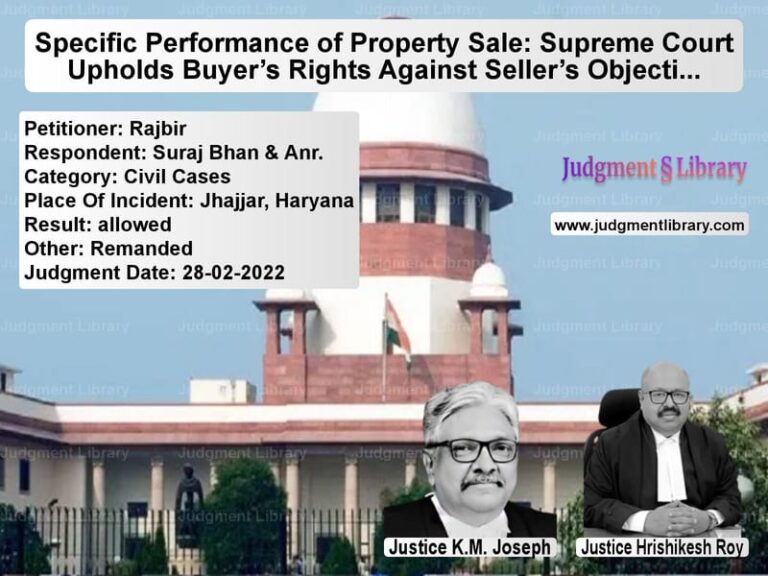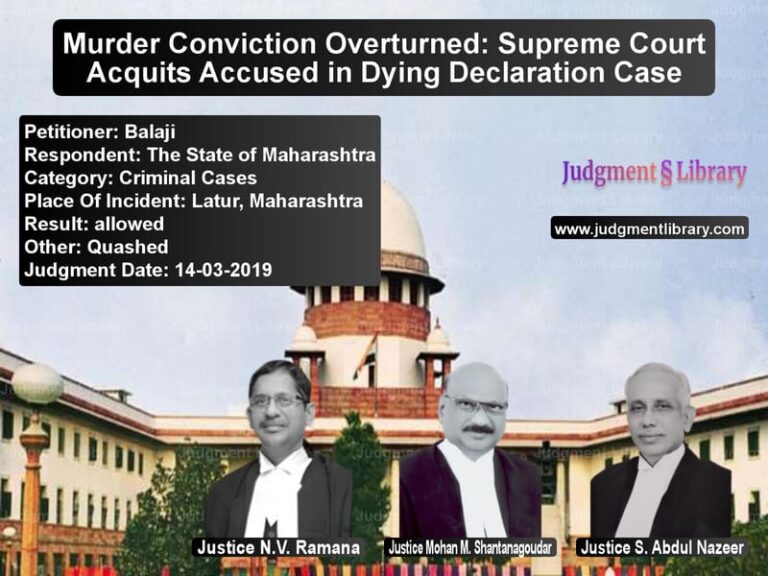Supreme Court Sets Aside Interim Order in Second Appeal Without Formulating Substantial Question of Law
The Supreme Court of India, in the case of U. Sudheera & Others vs. C. Yashoda & Others, addressed the issue of interim relief granted by the High Court in a second appeal under Section 100 of the Civil Procedure Code (CPC). The key question in the case was whether the High Court could grant an interim order without first framing a substantial question of law, as required under Section 100 CPC. The Court ruled in favor of the appellants, setting aside the interim order issued by the High Court, as it was passed without fulfilling the legal prerequisites.
Background of the Case
The case revolves around a dispute over property rights. The respondent, C. Yashoda, filed a suit for permanent injunction against the appellants. The trial court initially ruled in favor of the respondent, granting the injunction. However, the first appellate court reversed the decision, and the matter was brought before the High Court in the second appeal. During the appeal process, the High Court granted an interim order to maintain the status quo concerning the disputed property, without framing any substantial questions of law, which led to the present appeal.
The appellants, legal heirs of Defendant No. 5 in the suit, sought to challenge the interim relief granted by the High Court. They contended that the High Court had erred by granting relief without first determining the substantial question of law as mandated by Section 100 CPC. They also argued that no proper service had been made on all the respondents, and that the relief was granted based on a mere representation by the respondent’s counsel.
Petitioner’s Arguments
The appellants raised several points in their argument:
- The High Court granted the interim relief without formulating any substantial question of law, which violates the procedure under Section 100 CPC.
- The appellants argued that an interim order could not be passed merely on the basis of a representation and that the legal requirements of service and substantial questions of law needed to be addressed first.
- The appellants referred to the case of Ram Phal v. Banarasi, where the Court held that the High Court could not grant interim relief before framing substantial questions of law.
- The appellants further pointed out that the first appellate court had correctly set aside the injunction, and the High Court’s interference was not warranted under the circumstances.
Respondent’s Arguments
The respondent’s counsel countered the appellants’ arguments, asserting that:
- The High Court had inherent jurisdiction to pass interim orders in cases where immediate relief was necessary to protect the subject matter of the dispute.
- The respondent emphasized that the interim order was not a final decision, but only a temporary measure to preserve the status quo until the case was fully heard.
- The respondent also cited the case of Manohar Lal Chopra v. Rai Bahadur Rao Raja Seth Hiralal, where the Court held that interim relief could be granted to protect the ends of justice, even before framing the substantial questions of law.
- The respondent argued that the purpose of interim orders is to prevent irreparable harm and to safeguard the interests of the parties involved.
Supreme Court’s Observations
The Supreme Court Bench, comprising Justices R. Mahadevan and J.B. Pardiwala, made the following key observations:
Legal Framework for Second Appeal
“Section 100 of the CPC confers jurisdiction on the High Court to entertain a second appeal only when it involves a substantial question of law. It is the duty of the High Court to first formulate such a question before proceeding with the appeal.”
Importance of Framing Substantial Questions of Law
“The High Court’s jurisdiction in second appeals is restricted to substantial questions of law. It cannot proceed with the appeal unless such a question has been framed. The High Court erred by passing an interim order without first addressing this issue.”
Judicial Precedent on Interim Relief
The Court referred to several precedents, emphasizing the importance of adhering to procedural norms:
- In Ram Phal v. Banarasi, the Court had ruled that the High Court cannot grant interim relief without framing a substantial question of law.
- In Raghavendra Swamy Mutt v. Uttaradi Mutt, it was clarified that the High Court must formulate the substantial question of law before granting any interim relief.
- The Court also referenced Santosh Hazari v. Purushottam Tiwari, which held that the High Court must frame the substantial question of law before hearing the second appeal.
Analysis of the High Court’s Approach
“The High Court’s order to maintain the status quo was made in the absence of any substantial question of law being framed. This is a clear violation of the procedure under Section 100 of the CPC.”
Final Judgment
The Supreme Court allowed the appeal and set aside the interim order passed by the High Court, stating:
“The High Court has erred in granting interim relief without first framing substantial questions of law. As per the provisions of Section 100 CPC, the High Court must first formulate the substantial question of law before proceeding with the appeal.”
Read also: https://judgmentlibrary.com/supreme-court-denies-condonation-of-2422-day-delay-in-property-appeal/
Directions Issued
- The impugned order of the High Court dated September 20, 2024, was set aside.
- The case was remanded to the High Court to first frame substantial questions of law before proceeding with the appeal.
- The parties were directed to maintain the status quo as it existed before the High Court’s order.
Impact of the Judgment
This judgment highlights the importance of adhering to procedural safeguards in civil appeals. The key points from the ruling include:
- Second appeals under Section 100 CPC can only be entertained if substantial questions of law are framed.
- The High Court cannot pass interim orders without first addressing the legal requirements for admission of the second appeal.
- Judicial restraint is necessary in granting interim relief, as such decisions should be based on clearly defined legal issues.
Conclusion
The case of U. Sudheera & Others vs. C. Yashoda & Others serves as a reminder of the procedural norms governing civil appeals and the significance of framing substantial questions of law. The Supreme Court’s decision ensures that the legal process is followed diligently and that interim relief is granted only when the legal framework allows for it, maintaining fairness in the judicial system.
Petitioner Name: U. Sudheera & Others.Respondent Name: C. Yashoda & Others.Judgment By: Justice R. Mahadevan, Justice J.B. Pardiwala.Place Of Incident: Amaravathi, Andhra Pradesh.Judgment Date: 17-01-2025.
Don’t miss out on the full details! Download the complete judgment in PDF format below and gain valuable insights instantly!
Download Judgment: u.-sudheera-&-others-vs-c.-yashoda-&-others-supreme-court-of-india-judgment-dated-17-01-2025.pdf
Directly Download Judgment: Directly download this Judgment
See all petitions in Contract Disputes
See all petitions in Property Disputes
See all petitions in Specific Performance
See all petitions in Damages and Compensation
See all petitions in Consumer Rights
See all petitions in Judgment by R. Mahadevan
See all petitions in Judgment by J.B. Pardiwala
See all petitions in allowed
See all petitions in Set Aside
See all petitions in supreme court of India judgments January 2025
See all petitions in 2025 judgments
See all posts in Civil Cases Category
See all allowed petitions in Civil Cases Category
See all Dismissed petitions in Civil Cases Category
See all partially allowed petitions in Civil Cases Category







